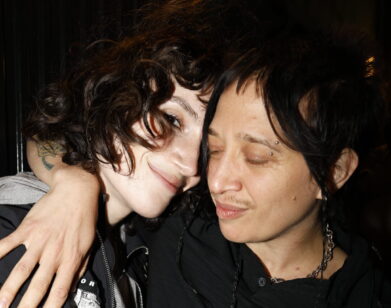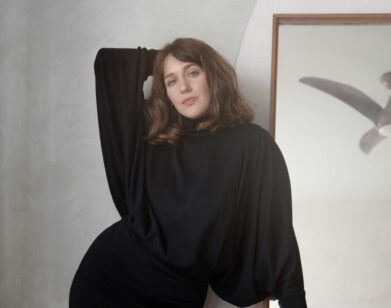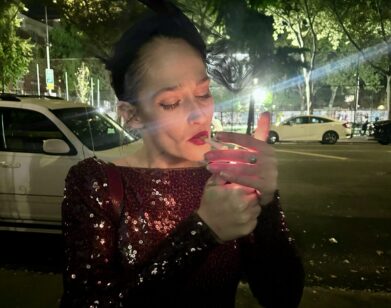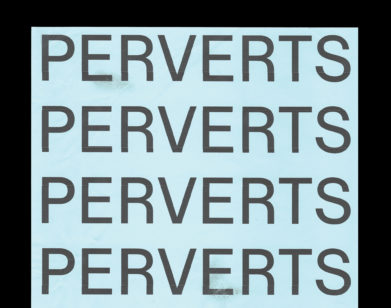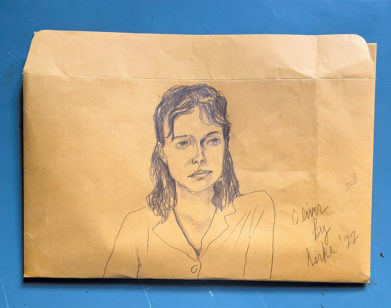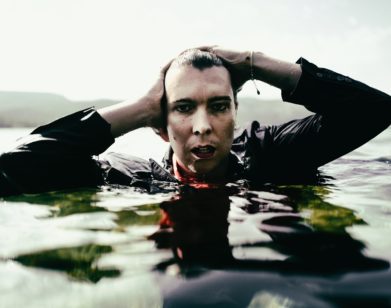IN CONVERSATION
Matt Starr and Jemima Kirke on Horny Poetry and Hugh Grant’s Tiny Nipples

Matt Starr and Jemima Kirke, photographed by Anna Maria Lopez.
“Does writing about this shit make you feel less gay?” Jemima Kirke asked Matt Starr, the writer and co-founder of Dream Baby Press, of his debut poetry collection, MOUTHFUL. “Writing this is working through shame,” replied Starr, whose poems radiate with a competing sense of both perversion and innocence, earnestly exploring boyhood, body image, and the author’s youthful obsession with men. “They’re so mean and so competitive,” says Starr. “I had such a hard time with male friendships growing up, which is why all my friends are girls and gays.” To mark the book’s launch, Starr hosted a bizzaro night of performance and readings at Church Street Boxing Gym, where Ivy Wolk (as Christina Aguilera from her “Dirrty” era), an uncanny Drake impersonator, writer Brontez Purnell, and Kirke all entered the ring. Amidst all the hubbub, Starr and Kirke peeled away to parse the book’s steamy contents and a number of other subjects, including rom-coms, masturbation, abandonment, and Hugh Grant‘s tiny nipples.
———
KIRKE: First of all, this ‘Bambi with boobs’ poem. Let me just read it: “I hated drawing as a kid. Everyone called me retarded. I really only liked to draw Bambi with boobs. One time I tried drawing a self-portrait, but it turned out looking like Bambi with boobs, so maybe they were right.”
STARR: I’m Bambi with boobs.
KIRKE: You are, but you are Bambi with boobs, pussy, and a cock. As I’m reading this, a very earnest sexual creature is forming. You know how children are sexual, but they’re as much sexual as they love to eat, right? It’s all pleasure.
STARR: That is literally what the book is about. Naive sexuality–seeing sex from the guise of a kid.
KIRKE: Yes, but it’s your appetite that’s intimidating and exciting and different. I was reading your poem about the hot dog and the power tools. Does writing about this shit make you feel less gay? Is it like, “If I write it down, it’s not shameful anymore”?
STARR: I’ve felt so much shame for a multitude of reasons. Writing this is working through shame. I know there are gay undertones, but when you’re a kid, you don’t have all this baggage.
KIRKE: Your sexuality is very much in all of these poems, whether it was in the past or not. This one called “Twenty pounds overweight when you’re seven is death”— it breaks my fucking heart.
STARR: It breaks my heart. When I was seven, I was so conscious of my thighs that I stopped wearing pants. I thought they made my thighs look big, so I would wear shorts because they opened up at the knees.
KIRKE: Were you a fat kid?
STARR: I was in my head. I felt a hundred pounds overweight when I was five.
KIRKE: That is a very feminine thing. Your appetite is very masculine and the insecurity is very feminine. I love this line, “Has bigger boobs than my girlfriend”…
STARR: Should we set up the context?
KIRKE: Oh, yes. So this poem goes, “The homeless woman always begging us for food in front of our apartment building has bigger boobs than my girlfriend. This makes her insecure, and it’s all she talked about for a week. She couldn’t believe someone with no money, bad hygiene, and a terrible sense of fashion, has bigger and better breasts than her. She said I couldn’t look at her, talk to her, give her food, or else.” What I love about it is that you made the comparison, which means you were looking at her tits and your girlfriend’s tits.
STARR: I was looking at everything.
KIRKE: I would’ve loved this because I like it when a man likes a dirty whore or a dog. It makes me feel like I don’t have to try as hard. Have your sexual inclinations ever put people off?
STARR: My writing, but not my personal life, no. It’s funny because I think there’s a conflation; I’m the one writing it, and people hear me perform, and they’re like, “Oh, he’s a pervert.”
KIRKE: You are, but we all are.
STARR: Yeah, I guess. It puts my parents off.
KIRKE: By the way, I wrote here, “The earnestness of your desire.” That’s what makes it special.
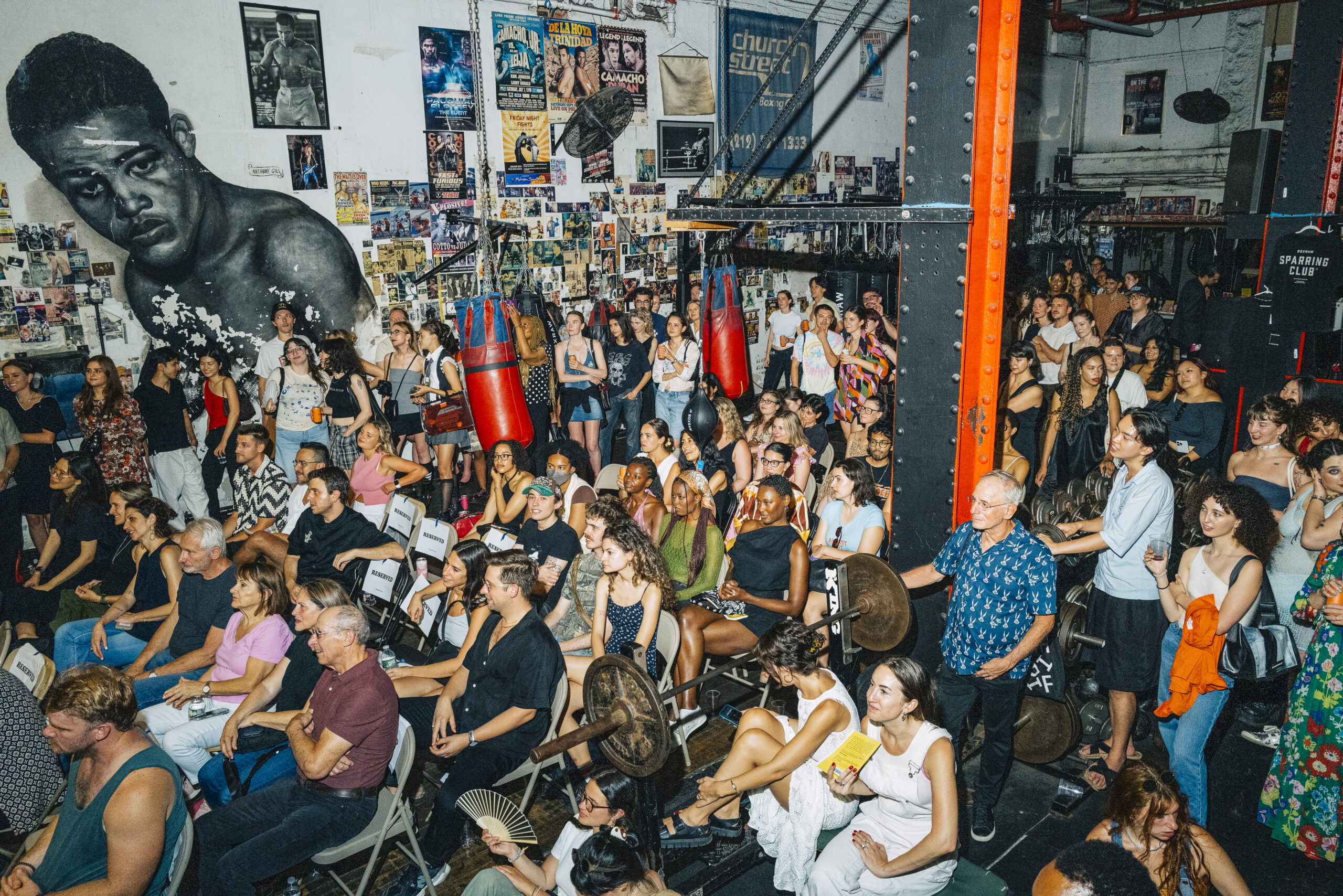
STARR: I mean, that’s what the whole book is about. None of this is designed to be provocative. What I’m trying to do is not censor myself and access innocent thoughts.
KIRKE: But when it’s sweetness mixed with perversion, that’s potent. I think that might be confusing for people. It’s like asking someone really nicely if you can see inside their butthole.
STARR: “Can you just spread your cheeks and let me look inside? I’ll jerk off, but just pretend I’m not here.”
KIRKE: “You don’t have to, I would just really like that.” Which poems did you take out and put back in? Were you unsure about any?
STARR: I reworked “Advice for Young Boys” so many times. There was an adult man and a teenage boy on a playground, and already that set up is uncomfortable.
KIRKE: There’s no evidence here that you are an adult.
STARR: Really? I guess because the book is written by me. I assume that I am the narrator.
KIRKE: You are, but you’re speaking as someone who’s remembering something. “But I said ultimately the most important thing he could do was to watch what he ate. And he didn’t like that though. And he clearly didn’t like being told what to do. He called me a faggot and ran away.” When I read that, it was like there was a connection brewing between two kids, both insecure, both helping each other out, then one abandons the other.
STARR: I never even thought about it that way, but I love it.
KIRKE: Because boys will abandon you.
STARR: That’s what they do. They’re so mean and so competitive.
KIRKE: Right. They hurt you in a different way that is just as cutting as girls. But I think rejection for a boy from another boy is its own hell.
STARR: Oh, I’ve felt it. It was horrible. I had such a hard time with male friendships growing up, which is why all my friends are girls and gays.
KIRKE: Did you do gay shit as a kid? It looks like you did.
STARR: No.
KIRKE: Yes, you did.
STARR: Well, I was thinking a lot about my childhood crushes recently. I was obsessed aesthetically with Jonathan Taylor Thomas. Do you remember him?
KIRKE: Of course. You didn’t know if you wanted to be him or…
STARR: Yeah, and I think about that all the time. I’m so attracted to male bodies, but I don’t want to fuck them. I showed you the image of Daniel Craig coming out of the water in Casino Royale. I have that image saved to my phone. I’m not joking.
KIRKE: It makes sense.
STARR: I’m obsessed with the way he looks. It’s probably my insecurity.
KIRKE: Yeah, but that’s why girls have pictures of women all over their rooms when they’re kids.
STARR: I know, but unless you’re an athlete and you have Michael Jordan, I don’t think boys have them.
KIRKE: No, they have girls and bikinis and nudes of women from magazines.
STARR: We had John Travolta in Pulp Fiction, but we didn’t have men.
KIRKE: We didn’t have John Travolta in Grease with that smile.
STARR: God, he’s fucking hot. I just rewatched it. But I didn’t consciously do gay shit, I was just obsessed with men as a kid. That’s why people think I’m gay, because I had these obsessions that really colored how I interacted with men. There was a lot of wanting to be other men or other boys.
KIRKE: So many men are obsessed with other men. They just do it in a more macho way, by competing with them rather than being in awe of them. What was your childhood like that led you to being like that?
STARR: Well, I think the shows and movies I watch are indicative of what you’re getting at. It’s like I’m obsessed with rom-coms and Sex and the City. But I love Gladiator. I love Jason Statham. I love a masculine lead, but then I’m also obsessed with You’ve Got Mail. I need both.
KIRKE: Why do you love a rom-com?
STARR: Because I was dumped and moved to the Upper West Side in March 2020 and I just needed that. I needed softness and I fell in love with Sex and the City.
KIRKE: But didn’t that hurt you even more?
STARR: It was me coming out of getting dumped and it aligned with the sweetness that you feel with that. So seeing Hugh Grant in Notting Hill–
KIRKE: I want to fuck Hugh Grant.
STARR: Same.
KIRKE: You know why? Because his nipples are so tiny that it–
STARR: Where have you seen his nipples?
KIRKE: Those nipples are in lots of things.
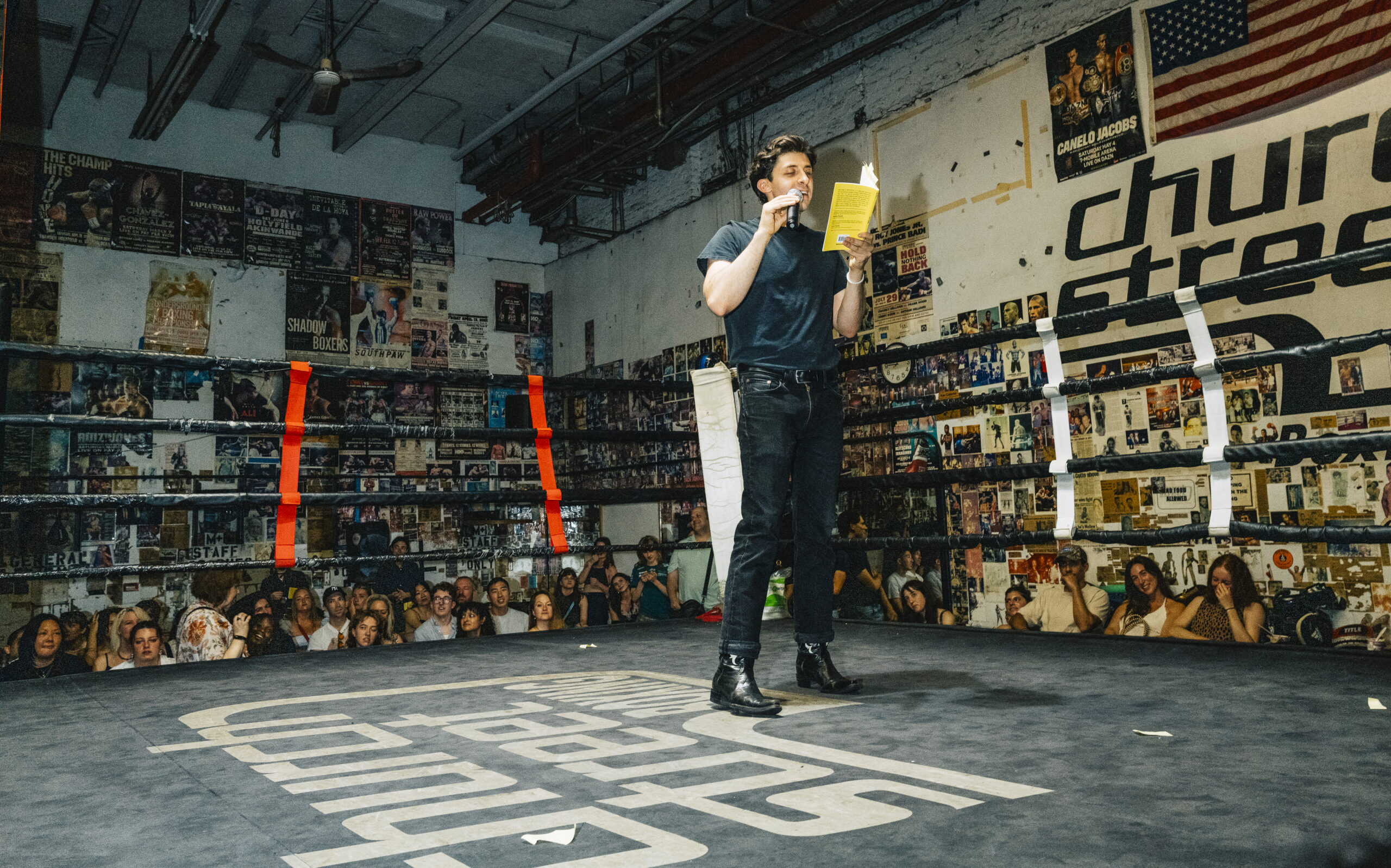
STARR: I’m obsessed.
KIRKE: Is he married?
STARR: Who knows? Probably.
KIRKE: So, you’re telling the stories of being insecure without the insecurity now, right? It’s not in the book. I mean, there’s mention of it, but I don’t feel that you are confessing something that you feel bad about.
STARR: That’s so interesting. I don’t feel bad about anything in there. It’s all pleasure and observation.
KIRKE: You’re like a sex god.
STARR: This is my You’ve Got Mail or When Harry Met Sally.
KIRKE: Why do you love When Harry Met Sally?
STARR: Because it’s so new [to me]. I feel like I’m 20 years late to everything. I started therapy late, started rom-coms late, discovered Drake late. I was always sensitive, but I never embraced it.
KIRKE: What about the sex that happens in rom-coms, though?
STARR: There is no sex in rom-coms.
KIRKE: That’s true.
STARR: There’s sweetness, though. I discovered rom-coms and Drake at the same time. Drake is funny and horny, rom-coms are sweet.
KIRKE: Do you like standing naked in front of a woman? Or is it scary?
STARR: Not scary. I was so insecure for so long. I’m so proud of my body now. I feel so good.
KIRKE: Really? Why?
STARR: I feel like a Subway ad when I say I’m proud of my body, but it’s true. I was so insecure for 30 years. And then I was working out every day, and that’s how I wrote the poems. I would run around Central Park and yell into my phone topless during the summer. I’ve never been topless in public except maybe once at the beach.
KIRKE: It’s nice when your body looks like your body, but a bit better.
STARR: Yeah. It’s not that it turns me on to be observed naked, but it feels good to be naked because I feel good. And I felt bad for so long.
KIRKE: You should eat a pint of ice cream and a whole pie while a girl sucks you off and see if that heals you.
STARR: That sounds like one of your answers on your Instagram Q&As.
KIRKE: Or vice versa, you guys both just eat so much.
STARR: And just masturbate next to each other?
KIRKE: Yeah. Just spray him in the face.
STARR: You spray him in the face.
KIRKE: Are you eating compulsively now or are you eating mindfully?
STARR: Mindfully.
KIRKE: Okay.
STARR: I’m enjoying it. And Drake, too. I don’t know what I saw that got me into him, but I became obsessed. I must’ve seen an interview and I thought he was being funny. It seemed like he didn’t take himself too seriously.
KIRKE: Isn’t he a pedophile?
STARR: I don’t know. Somebody said that.
KIRKE: Yeah, Kendrick Lamar.
STARR: Well, they’re fighting. I don’t know if that’s real. Anyway, his music’s fun. I discovered him as I really started focusing on poetry. Just his vibe–it’s fun, it’s catchy. My influences were rom-coms, Sex and the City, Lou Reed, Leonard Cohen. And I would think about how I would want to perform to an audience. I always knew I wanted it to be a show. I wanted the poems to be exciting and fun.
KIRKE: There’s something about writing a poem that is kind of meant for show, right? I mean, it’d be nice if someone read it.
STARR: When I’m writing them, I’m making myself laugh. I’m really having a good time. Humor is my Trojan horse. It’s not comedy, but I want there to be an underlying sense of humor throughout.
KIRKE: Yeah.
STARR: Any parting thoughts?
KIRKE: Point me to a poem that is maybe a bit painful.
STARR: Let me think.
KIRKE: I mean, they all are, I’m sure, to some extent.
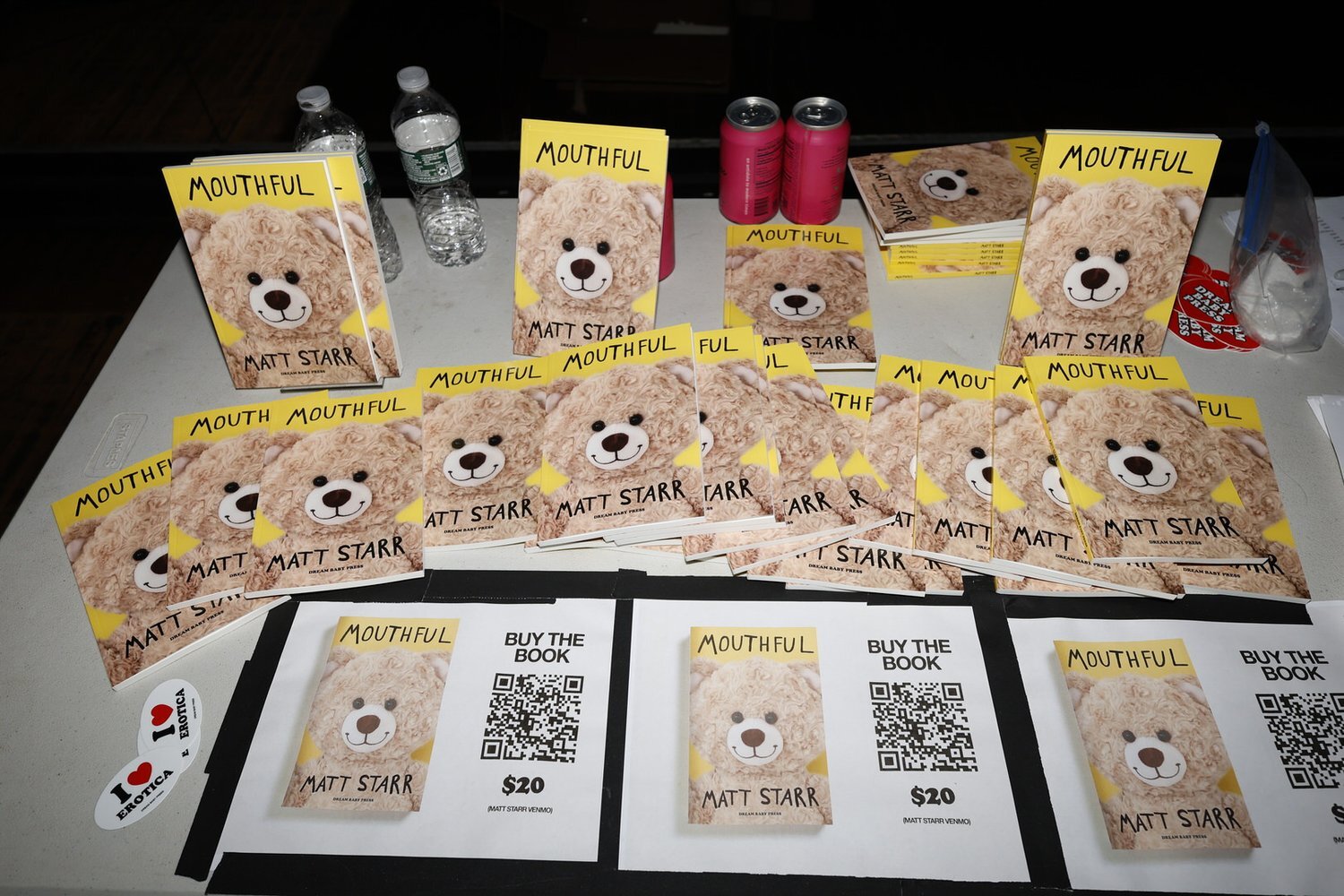
STARR: Well, I was falling in love while writing these poems, and that was a huge inspiration. I have this recurring image in my head of me as a kid, seeing this girl in a dentist’s office and just being obsessed with the way she looks.
KIRKE: Was her mouth open?
STARR: Yeah. Everything’s open. I keep going back to that image subconsciously and feeling lustful and excited again for the first time in a long time. To me, that’s my real-life rom-com.
KIRKE: Is one of the things you love about the rom-com that it separates you from getting too heady about it? I get really carried away with falling in love like, “This is magic. It’s amazing. We were born in different parts of the world and we found each other.” But it’s going to end most likely, or at least this phase of it is going to end. But the rom-com, it’s got a beginning, middle, and end, and it’s unrealistic. It marks a moment of falling in love that’s really exciting, but it’s just a moment.
STARR: Totally. And it’s so innocent. And you look at the background of my phone, it’s Paddington Bear. He’s the most innocent character and he’s modeled off Charlie Chaplin and Buster Keaton. I think there’s a level of innocence in the way he moves.
KIRKE: Does he move that much?
STARR: Have you seen these films?
KIRKE: The CGI ones?
STARR: They’re so good. It’s not CGI, that’s a real bear.
KIRKE: No, it isn’t a real bear.
STARR: Have you seen them?
KIRKE: With the coat on?
STARR: Yes, with the coat on.
KIRKE: What are you talking about? That’s a fake bear.

